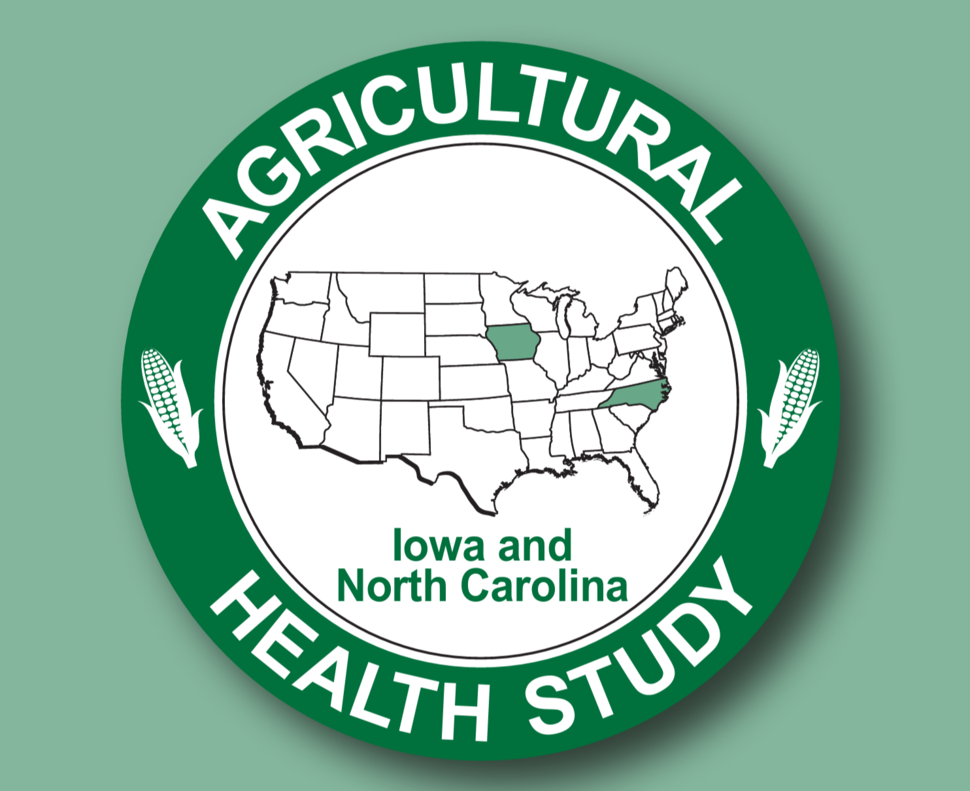Overview
The Agricultural Health Study (AHS) is a prospective study of cancer and other health outcomes in a cohort of licensed pesticide applicators and their spouses from Iowa and North Carolina. The AHS began in 1993 with the goal of answering important questions about how agricultural, lifestyle and genetic factors affect the health of farming populations. The Agricultural Health Study is funded by the National Cancer Institute and the National Institute of Environmental Health Sciences in collaboration with the United States Environmental Protection Agency. The National Institute for Occupational Safety and Health has previously played an important role in the study.
More than 89,000 farmers and their spouses in Iowa and North Carolina have participated in the study. Their participation has provided, and continues to provide, the data that researchers need to help the current and future generations of farmers and their families live healthier lives.
Study Team
The study is a collaborative project of the National Cancer Institute, the National Institute of Environmental Health Sciences (NIEHS), and the U.S. Environmental Protection Agency (EPA).
Co-Principal Investigators, DCEG
Laura Beane Freeman, Ph.D., senior investigator
Jonathan Hofmann, Ph.D., M.P.H., senior investigator
Co-Principal Investigators, NIEHS
Co-Principal Investigator, EPA
Dr. Kent Thomas
Background & Purpose
Since it began in 1993, the study has included three cohort-wide interviews to obtain information on agricultural practices and pesticide use, other occupational exposures, lifestyle factors, diseases, and medication use, and one cohort-wide interview focused primarily on updating information on non-cancer health outcomes. Cancer incidence has been ascertained via linkage to population-based cancer registries in the study states, and mortality through linkage to state mortality registries and the National Death Index. Mouth rinse samples including buccal cell DNA, were collected from 39 percent of the cohort.
In addition, there have been a number of targeted sub-studies, focused on specific scientific questions. These studies include information on pesticide exposure monitoring from a sample of farms and the collection of a variety of biologic tissues from selected samples of participants. Collaborative ventures with extramural investigators are encouraged.
Study Design
The study began by collecting baseline information from participants when they enrolled (1993-1997). Follow-up telephone interviews were conducted in the second (1999-2003) and third phases (2005-2010) of the study. The Phase 2 interview was completed by 64% of private applicators, 59% of commercial applicators, and 74% of spouses. Participants provided updated information on farming practices, lifestyle, and health and were asked to complete a dietary questionnaire and provide a sample of cheek cells as a source of DNA. The Phase 3 interview also updated information on farming practices, lifestyle, and health. It was completed by 46% of enrolled private applicators and 62% of enrolled spouses. All participants who were eligible to participate at Phase 3 were asked to provide information updating health and farming status in Phase 4. Participants completed the questionnaires either by mail, telephone or through the Internet; for the first time, next-of-kin were able to provide health update information for those who could not complete the questionnaires themselves.
Data collection began in 2013 and ended 2015; 61% of eligible cohort members (applicators and spouses) participated. Following the same eligibility as the Phase 4 follow-up sample, Phase 5 data collection began in 2019 and was completed in 2021; 50% of eligible participants (or next of kin) completed questionnaires updating farming status and health outcomes through a web survey, mail survey or phone interview.
Select Sub-Studies
Biomarkers of Exposure and Effect in Agriculture (BEEA) Study
Agricultural exposures including pesticides, endotoxins, and diesel exhaust have been associated with risk of various cancers, although the biological mechanisms underlying these associations are generally not well understood. To address this gap, AHS investigators initiated the Biomarkers of Exposure and Effect in Agriculture (BEEA) study to collect biospecimens and updated information about pesticide use and other agricultural exposures from over 1,600 farmers/pesticide applicators. Read more about BEEA.
For more information, contact Jonathan Hofmann.
Outdoor Air Pollution from Intensive Animal Agricultural
Studies of ambient pollution exposures from concentrated animal feeding operations and their associations with health outcomes in the AHS.
For more information, contact Rena Jones.
Information for Participants and Collaborators
More information for Agricultural Health Study participants and collaborators is available at the study website.
